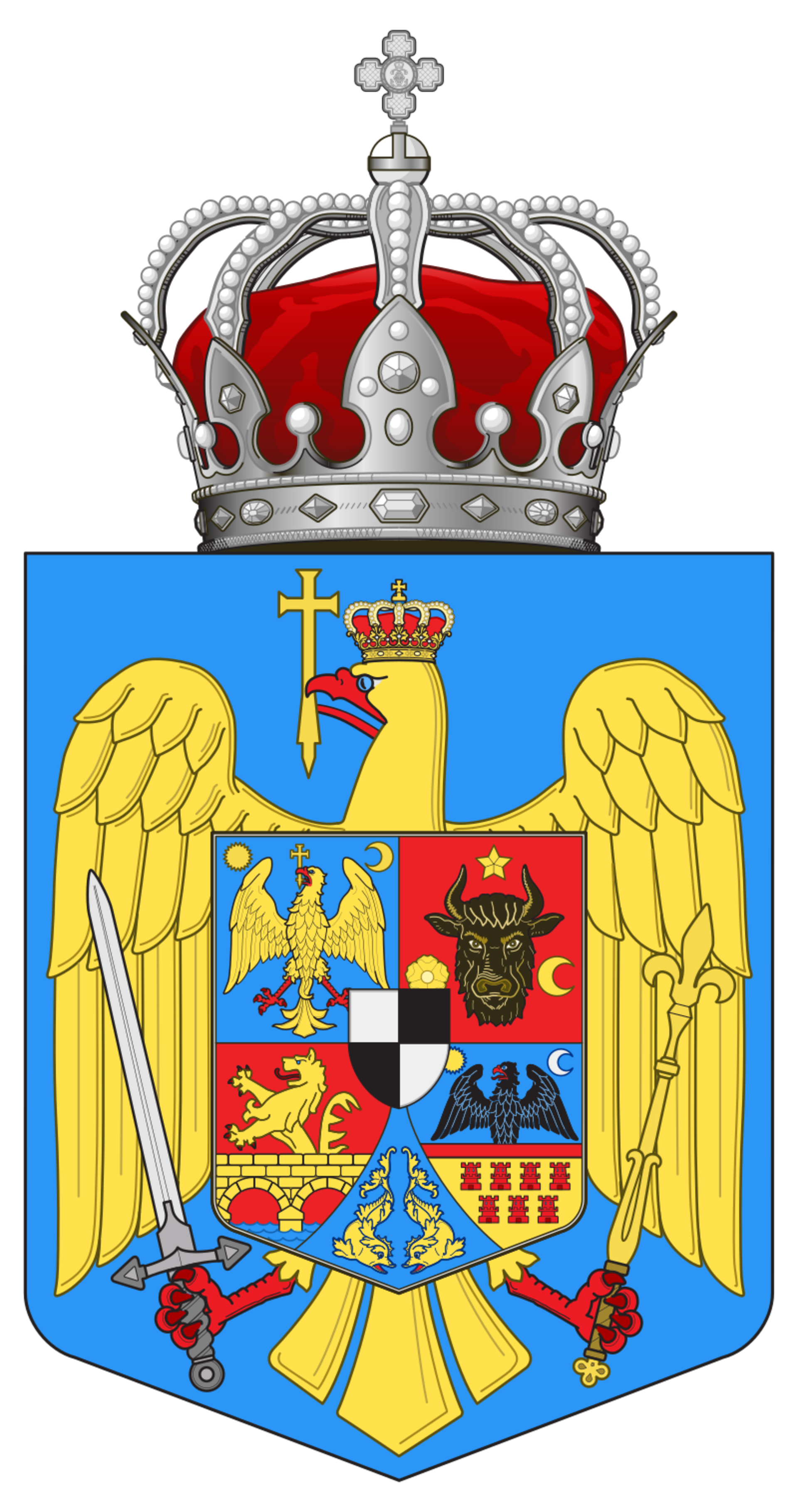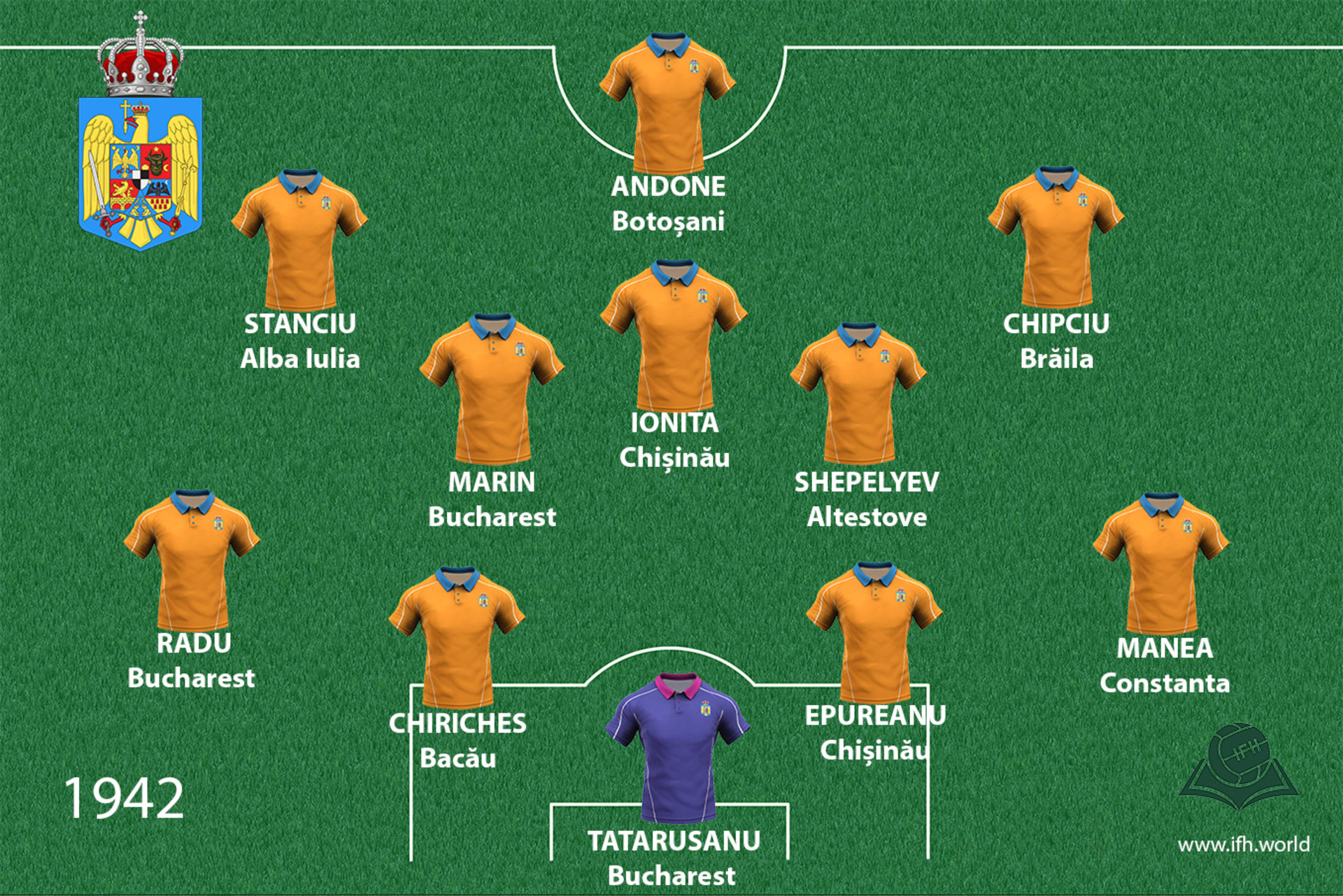Romania
Marshal Ion Antonescu, military dictator of Romania from 1940-1944, advocated a policy of ethnic cleansing to purify the Romanian nation no less radical than Hitler’s own racial ideology. Main reason for that policy is the fact that Political, racial, religous and economic anti-Semitism had developed deep roots in all layers of Romanian society long before WW II.

Coat of arms
Shirt
| Position | First name | Last name | Mjesto rođenja | Like | Dislike |
|---|
(Today: Romania (without Trnsylvannia), Moldova and part of Ukraine with Odessa)
In the summer of 1940, Romania had to depart Besarabia and Northern Bukovina to the Soviet Union. Then in the fall of the same year, under pressure from Italy and Germany, also the Northern Transylvania to Hungary. Because of the latter King Carol II was forced to abdicate. A coalition government of radical right-wing military officers, under General Ion Antonescu and the Iron Guard, and by the end of the year Romania formally joined the Axis alliance. At the beginning of 1941. Antonescu with support from the German army won a three-day civil war against the Iron Guard. Led by Antonescu, Romania participated fully in the Operation Barbarossa in June 1941. [1] Patriarch blessed the army in fighting “the holy war” against the communist -“nation without God.”[2] Following the invasion, Romania reannexed Bessarabia and northern Bukovina and got the territory between the Dniester and Bug Rivers (the region "Transnistria.).[3]
Unlike most of Hitler’s allies, who in practice were merely German satellites, Romania was able to maintain its independence and freedom of action not only through military cooperation with Hitler against the Soviet Union, but also by using its vast reserves of oil, which Germany’s war effort was dependent upon, as economic leverage. As such, Antonescu’s policies of ethnic cleansing were carried out independently, though with the approval, of Hitler’s Third Reich, making Romania’s persecution of Jews a distinct chapter in the history of the Holocaust.[4
In the case of Romania, anti-Semitism had developed deep roots in all layers of society. It was particularly pronounced during the interwar period but it was deeply connected with the constructing of the Romanian national identity since its beginnings in the 19th century. After independence (1878) Romanian nationalist strove to define which groups belonged to the Romanian nation.[5]
Orthodoxy was the major condition of being Romanian. Church nationalist discourse was incorporated by intellectuals in constructing the myth of Romanian exceptionalism: Romanians were the only Latin people of the Orthodox faith and this fact “enhances the value of our race.”[6] Jews were barred from naturalization during the 19th century on the basis of their non-Christianity. Moreover, they were reffered as being murderers and betrayers of Jesus Christ etc. Unlike other minorities in Romania - the Turk, the Pole, the Hungarian, the Russian and the Greek - the Jew carried the label of both external and internal foreigner in Romanian culture. It was believed that Jews would resist assimilation because it would lead to the disappearance of the Jews as a distinctive cultural type. Also, because of their lack of attachments to Romanian cultural and historical heritage. [7]
Besides the Tsarist Russia Romania was the only European state before World War I to refuse to emancipate its Jews. Finally in the aftermath of World War I, under considerable pressure from the Allies the Government agreed in principle to grant Romanian citizenship to Jews inhabiting any Romanian territory who do not possess another nationality. But the Romanians found ways to restrict Jewish civil rights particularly barring Jews from many jobs in the army, public service, high courts, and universities.[8]
The antisemitic sentiment just strengthened when the worldwide press gave inordinate attention to the fact that Jews played a leading role in the Russian and Hungarian communist revolutions. In addition, Jews were viewed as the main economic exterminators of the Romanian people, especially during the economic crisis of the '30s, since they were in full swing of banking, brokerage and attorney positions. [9]
In general, ethnic minorities in Romania (Jews, Germans, Hungarians, Bulgarians, etc.) accounted for 28% of the total population. Privileged under the former imperial order, these ethnic minorities were still dominant in the urban population, the liberal professions, and regional bureaucracy. So, Romanian political elites perceived the domination of socioeconomic life by ethnic minorities as a major stumbling block in the process of national consolidation,.[10]
During years of propaganda of “cultural purification” and “national regeneration”, the Romanian sense of community became altered and unsympathetic towards otherness. Considering everythig, it's no wonder that the anti-Semitic episode reached its climax during the WW II.[11]
- [1] ''Romania'', https://encyclopedia.ushmm.org/content/en/article/romania
- [2] Lucian N. Leustean, “For the Glory of Romanians”: Orthodoxy and Nationalism
in Greater Romania, 1918–1945, Nationalities Papers, Vol. 35, No. 4, September 2007.,735 - [3] ''Romania'', https://encyclopedia.ushmm.org/content/en/article/romania
- [4] Christopher J. Kshyk,The Holocaust in Romania: The Extermination and Protection of the Jews Under Antonescu's Regime, 2014, VOL. 6 NO. 12
- http://www.inquiriesjournal.com/articles/947/the-holocaust-in-romania-the-extermination-and-protection-of-the-jews-under-antonescus-regime
- [5] William Brustein, Amy Ronnkvist, The roots of anti-Semitism: Romania before the Holocaust, Journal of Genocide Research, 4:2,220, 223
- [6] Lucian N. Leustean, “For the Glory of Romanians”: Orthodoxy and Nationalism
in Greater Romania, 1918–1945, Nationalities Papers, Vol. 35, No. 4, September 2007., 718, 729, 730 - [7] William Brustein, Amy Ronnkvist, The roots of anti-Semitism: Romania before the Holocaust, Journal of Genocide Research, 4:2, 212,214
- [8] Isto, 212, 213
- [9] Isto 211-235, str 219
- [10] Constantin Iordachi, ''Charisma, Religion, and Ideology: Romania’s Interwar Legion of the Archangel Michael'', Chapter in IDEOLOGIES AND NATIONAL IDENTITIES, John Lampe, Mark Mazower, Budapest: ceup 2006, https://books.openedition.org/ceup/2418
- [11] Alexandru Jădăneanţ, The collapse of constitutional legalism: Racial laws and the ethnocultural construction of national identity in Romania during World War II, Procedia Social and Behavioral Sciences, Volume 183, 14 May 2015, 41,44
Sources
- William Brustein, Amy Ronnkvist, The roots of anti-Semitism: Romania before the Holocaust, Journal of Genocide Research, 4:2
- Constantin Iordachi, ''Charisma, Religion, and Ideology: Romania’s Interwar Legion of the Archangel Michael'', Chapter in IDEOLOGIES AND NATIONAL IDENTITIES, John Lampe, Mark Mazower, Budapest: ceup 2006, https://books.openedition.org/ceup/2418
- Alexandru Jădăneanţ, The collapse of constitutional legalism: Racial laws and the ethnocultural construction of national identity in Romania during World War II, Procedia Social and Behavioral Sciences, Volume 183, 14 May 2015
- Lucian N. Leustean, “For the Glory of Romanians”: Orthodoxy and Nationalism in Greater Romania, 1918–1945, Nationalities Papers, Vol. 35, No. 4, September 2007.
- Christopher J. Kshyk,The Holocaust in Romania: The Extermination and Protection of the Jews Under Antonescu's Regime, 2014, VOL. 6 NO. 12
- http://www.inquiriesjournal.com/articles/947/the-holocaust-in-romania-the-extermination-and-protection-of-the-jews-under-antonescus-regime
- ''Romania'', https://encyclopedia.ushmm.org/content/en/article/romania
